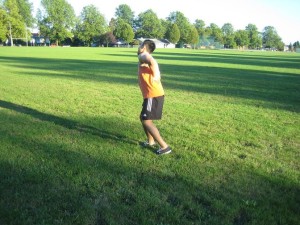Muscle strain is an injury to the muscles or tendons (links muscles together) that pertains to the sudden tearing of the muscle fibers caused by exertion or over stretching. Muscle strain may occur partially or completely, with the latter being more difficult to treat. The most commonly affected muscles of muscle strain are the lower back, shoulder, neck and hamstring (muscle behind the thigh). Muscle strain should not be confused with muscle sprain, which is caused by torn fibers in the ligament.
Muscle strain is also called pulled muscle or muscle tear.
Causes of Muscle Strain
Muscle strains don’t always occur with extreme or strenuous activities. They may also occur while doing normal activities. Muscle strain usually results from fatigue, improper or overuse. The following may lead to muscle strain:
- Sports training or performance (which makes athletes more at risk for muscle strain)
- Quick and abrupt heavy lifting
- Work tasks
Signs and Symptoms of Muscle Strain

The signs and symptoms of muscle strain may include:
- Local bleeding or bruising (or any skin discoloration) caused by damage in the small blood vessels
- Open cuts
- Swelling
- Redness
- Stiffness that is localized
- Pain upon moving the affected muscle or joint
- Pain that manifests even at rest caused by irritation of the nerve endings in the affected region
- Muscle or tendon weakness
- Unable to use the muscle (loss of efficient movement)
First Aid Management for Muscle Strain
Mild to moderate cases of muscle strain can be managed at home by giving first aid to casualties. The primary goal of muscle strain is to reduce pain and swelling. This can be done by following price and avoiding HARM.
PRICE Therapy (Protect, Rest, Ice, Compress, Elevate)
- Protect the strained muscle from further injury –best to use a support that will increase protection
- Rest the strained muscle or tendon, thus do not engage in further activities that may worsen the injury; it is advisable to avoid activity for 48 to 72 hours
- Ice wrapped in cloth or towel should be placed over the affected muscle or tendon for 15 to 20 minutes every 2 to 3 hours while awake. Do not apply ice directly on the skin and ensure that it is not left for too long.
- Compress or bandage the affected area to help limit swelling and movement that may exacerbate the injury. Bandage firmly but not too tightly to ensure that blood flow is maintained.
- Elevate the affected area for 12 inches or place on top of a pillow to help limit swelling.
- Bonus: Take painkillers and anti-inflammatory medicines, such as ibuprofen and aspirin to help reduce pain and improve movement.
HARM (Heat, Alcohol, Running, Massage)
- Avoid Heat on the affected area as this may actually increase pain and swelling. Only apply heat once there has been an obvious reduction in swelling.
- Avoid Alcohol as apart from hastening the healing period, it increases bleeding and swelling
- Avoid Running or any form of exercise that may lead to aggravation.
- Avoid Massage because it may increase swelling and bleeding.
Learn how to properly manage muscle strain and other common muscle injuries by enrolling in First Aid Courses.
Muscle strain is the sudden tearing of the muscle fibers due to exertion or over stretching. It is also called pulsed muscle. First Aid Treatment for muscle strain follows PRICE and avoids HARM.
